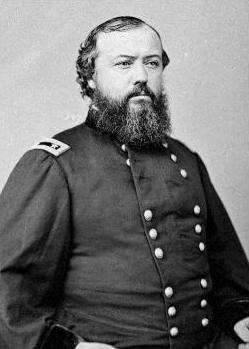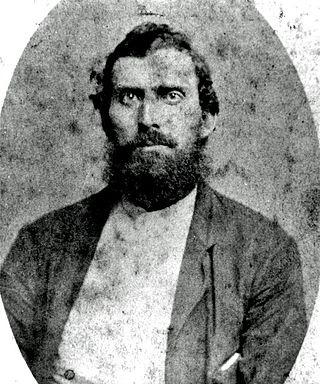Related Research Articles

The American Civil War was a civil war in the United States between the Union and the Confederacy, which was formed in 1861 by states that had seceded from the Union. The central conflict leading to war was a dispute over whether slavery should be permitted to expand into the western territories, leading to more slave states, or be prohibited from doing so, which many believed would place slavery on a course of ultimate extinction.

Jefferson F. Davis was an American politician who served as the first and only president of the Confederate States from 1861 to 1865. He represented Mississippi in the United States Senate and the House of Representatives as a member of the Democratic Party before the American Civil War. He was the United States Secretary of War from 1853 to 1857.

Pierre Gustave Toutant-Beauregard was an American military officer known as being the Confederate General who started the American Civil War at the battle of Fort Sumter on April 12, 1861. Today, he is commonly referred to as P. G. T. Beauregard, but he rarely used his first name as an adult. He signed correspondence as G. T. Beauregard.

The Confederate States Army, also called the Confederate Army or the Southern Army, was the military land force of the Confederate States of America during the American Civil War (1861–1865), fighting against the United States forces to win the independence of the Southern states and uphold and expand the institution of slavery. On February 28, 1861, the Provisional Confederate Congress established a provisional volunteer army and gave control over military operations and authority for mustering state forces and volunteers to the newly chosen Confederate States president, Jefferson Davis (1808-1889). Davis was a graduate of the United States Military Academy, on the Hudson River at West Point, New York, and colonel of a volunteer regiment during the Mexican–American War (1846-1848). He had also been a United States senator from Mississippi and served as U.S. Secretary of War under 14th President Franklin Pierce. On March 1, 1861, on behalf of the new Confederate States government, Davis assumed control of the military situation at Charleston Harbor in Charleston, South Carolina, where South Carolina state militia had besieged the longtime Federal Fort Sumter in Charleston harbor, held by a small U.S. Army garrison under the command of Major Robert Anderson (1805-1871). By March 1861, the Provisional Congress of the Confederate States meeting in the temporary capital of Montgomery, Alabama, expanded the provisional military forces and established a more permanent regular Confederate States Army.

The president of the Confederate States was the head of state and head of government of the Confederate States. The president was the chief executive of the federal government and commander-in-chief of the Confederate Army and Navy.

Neo-Confederates are groups and individuals who portray the Confederate States of America and its actions during the American Civil War in a positive light. The League of the South, the Sons of Confederate Veterans and other neo-Confederate organizations continue to defend the secession of the 11 former Confederate States.

Shelby Dade Foote Jr. was an American writer, historian and journalist. Although he primarily viewed himself as a novelist, he is now best known for his authorship of The Civil War: A Narrative, a three-volume history of the American Civil War.

The Sons of Confederate Veterans (SCV) is an American neo-Confederate nonprofit organization of male descendants of Confederate soldiers that commemorates these ancestors, funds and dedicates monuments to them, and promotes the pseudohistorical Lost Cause ideology and corresponding white supremacy.
The Confederate Secret Service refers to any of a number of official and semi-official secret service organizations and operations performed by the Confederate States of America during the American Civil War. Some of the organizations were directed by the Confederate government, others operated independently with government approval, while still others were either completely independent of the government or operated with only its tacit acknowledgment.
Pelican Publishing Company is a book publisher based in Elmwood, Louisiana, with a New Orleans postal address. It was acquired in 2019 by Arcadia Publishing, a leading publisher of local and regional content in the United States.

Hugh Boyle Ewing was a diplomat, author, attorney, and Union Army general during the American Civil War. He was a member of the prestigious Ewing family, son of Thomas Ewing, the eldest brother of Thomas Ewing, Jr. and Charles Ewing, and the foster brother and brother-in-law of William T. Sherman. General Ewing was an ambitious, literate, and erudite officer who held a strong sense of responsibility for the men under his command. He combined his West Point experience with the Civil War system of officer election.

Samuel Gibbs French was an American military officer from New Jersey. He graduated from the United States Military Academy in 1843, served as a captain in the U.S. Army in the Mexican-American War, and was wounded at the Battle of Buena Vista. In 1856, he resigned his commission to manage a plantation in Mississippi he obtained through marriage.
Historiography examines how the past has been viewed or interpreted. Historiographic issues about the American Civil War include the name of the war, the origins or causes of the war, and President Abraham Lincoln's views and goals regarding slavery.

William Charles "Jack" Davis is an American historian who was a professor of history at Virginia Tech and the former director of programs at that school's Virginia Center for Civil War Studies. Specializing in the American Civil War, Davis has written more than 40 books on that subject and other aspects of early southern U.S. history, such as the Texas Revolution. He is the only three-time winner of the Jefferson Davis Prize for Confederate history and was awarded the Jules and Frances Landry Award for Southern History. His book Lone Star Rising has been called "the best one-volume history of the Texas revolution yet written".

Newton Knight was an American farmer, soldier, and Southern Unionist in Mississippi, best known as the leader of the Knight Company, a band of Confederate Army deserters who resisted the Confederacy during the Civil War. Local legends tell of Knight and his men forming the "Free State of Jones" in the area in and around Jones County, Mississippi, at the height of the war. The nature and extent of the Knight Company's opposition to the Confederate government is disputed among historians. After the war, Knight joined the Republican Party and served in Mississippi's Reconstruction government as a deputy U.S. Marshal.

The conclusion of the American Civil War commenced with the articles of surrender agreement of the Army of Northern Virginia on April 9, at Appomattox Court House, by General Robert E. Lee and concluded with the surrender of the CSS Shenandoah on November 6, 1865, bringing the hostilities of the American Civil War to a close. Legally, the war did not end until a proclamation by President Andrew Johnson on August 20, 1866, when he declared "that the said insurrection is at an end and that peace, order, tranquillity, and civil authority now exist in and throughout the whole of the United States of America."

Jefferson Davis, created by Henry Augustus Lukeman, is a bronze sculpture of Jefferson Davis – a U.S. Senator, U.S. Secretary of War, plantation owner and the only President of the Confederate States of America during the American Civil War – commissioned by the U.S. State of Mississippi for inclusion in National Statuary Hall Collection at the United States Capitol's National Statuary Hall, in Washington, D.C. The statue was controversial at the time of its unveiling and there have been multiple efforts to remove it from the Capitol since 2015.
With Ballot and Bayonet: The Political Socialization of American Civil War Soldiers is a 1998 non-fiction book by Joseph Allan Frank, published by University of Georgia Press.
Jefferson Davis: Unconquerable Heart is a 1999 non-fiction book by Felicity Allen, published by the University of Missouri Press, about Jefferson Davis.
First Lady of the Confederacy: Varina Davis's Civil War is a 2006 book by Joan E. Cashin, published by Harvard University Press. Its subject is Varina Davis.
References
- Crist, Lynda L (1999). "Was Jefferson Davis Right?". Journal of Southern History . 65 (2): 457. JSTOR 2587431. (the "Book Notes" PDF contains multiple reviews: the review of this book is on page 4/7)
- Dirck, Brian (1999). "With Ballot and Bayonet: The Political Socialization of American Civil War Soldiers / Was Jefferson Davis Right?". The Journal of American History . 86 (2). Oxford University Press: 784–786. doi:10.2307/2567108. JSTOR 2567108. - Also available at ProQuest
- McKnight, Brian D. (2001). "was jefferson davis right? gretna, la: pelican publishing company 1998. 352 p.". The Journal of Mississippi History . 63 (1). Jackson, Mississippi: Mississippi Historical Society: 81–82. - Record at DeGruyter
Notes
- 1 2 3 4 Crist, p. 457.
- 1 2 3 Dougan, Michael B. (April 1999). "Was Jefferson Davis Right? By James Ronald Kennedy and Walter Donald Kennedy". Arkansas Review: A Journal of Delta Studies . 30 (1). ISSN 1075-4008 – via EBSCOhost/Wikipedia Library.
- ↑ "Author defends concepts of "state's rights"". The Knoxville News-Sentinel . Knoxville, Tennessee. 1996-01-21. p. B9. - Clipping at Newspapers.com.
- 1 2 3 4 5 6 McKnight, p. 82.
- 1 2 3 McKnight, p. 81.
- ↑ Sobran, Joseph (1999-08-20). "Book presents case for confederacy". Lansing State Journal . Lansing, Michigan. Universal Press Syndicate. p. 9A. - Clipping from Newspapers.com.
- ↑ Dirck, p. 786.
- 1 2 3 Dirck, p. 785.